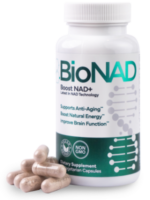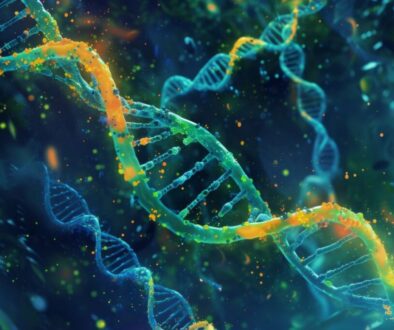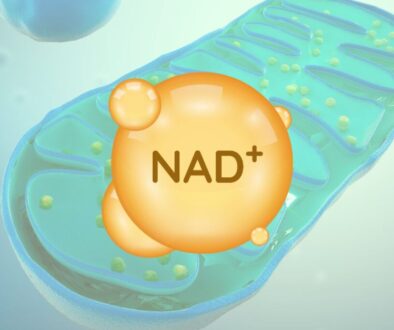How NAD+ Fights Oxidative Stress For Better Aging

Published March 10, 2025
Ever wonder what drives aging and diseases like Alzheimer’s or Parkinson’s? It starts in your cells. NAD+ (Nicotinamide Adenine Dinucleotide) is crucial for energy and DNA repair, keeping cells healthy. However, oxidative stress, caused by excess reactive oxygen species (ROS), disrupts this process. When your body can’t compensate, it speeds up aging, leading to serious health issues. Understanding NAD+ oxidative stress may be the key to better health and longevity.
In this article, we’ll explore the connection between NAD+ oxidative stress and health, highlighting how maintaining NAD+ levels can mitigate aging and promote better well-being.
The Crucial Role Of NAD+ In Cellular Function
NAD+ is a coenzyme indispensable to many biochemical processes that sustain cellular health and resilience. Supporting essential functions ensures cells operate efficiently and withstand damage. Here’s how NAD+ contributes to cellular vitality:
- Energy production. NAD+ is central to cellular respiration, the process by which nutrients are converted into ATP—the energy currency of cells. It moves electrons by switching between oxidized (NAD+) and reduced (NADH) forms. This process powers the cycle that generates energy for our cells.
- DNA repair and cellular integrity. NAD+ is critical for repairing DNA damage caused by aging or environmental stressors. Enzymes like PARPs (Poly-ADP Ribose Polymerases) rely on NAD+. They repair DNA breaks to maintain genetic stability. This helps preserve cellular health.
- Gene regulation. NAD+ activates sirtuins. These are proteins that regulate metabolism, stress resilience, and lifespan. By influencing gene expression, sirtuins promote long-term cellular functionality and health.
NAD+ is key in energy production, DNA repair, and gene regulation. It’s essential for cellular life, helping safeguard health and resilience at a fundamental level.

Oxidative Stress And Aging
Oxidative stress arises once reactive oxygen species (ROS) are imbalanced. This damages cellular components like lipids, proteins, and DNA. ROS are natural byproducts of metabolism but can also come from external factors like pollution and UV radiation.
Over time, oxidative damage builds up in the body. This weakens tissues and impairs immune function. It also increases the risk of age-related conditions like Alzheimer’s, diabetes, and heart disease.
The oxidative stress theory of aging highlights ROS as a key driver of cellular decline. Antioxidants are crucial for neutralizing harmful molecules. Cellular defense mechanisms also play a key role. NAD+ supports these defenses, helping to reduce oxidative damage and slow aging.
How NAD+ Fights Oxidative Stress
NAD+ plays a critical role in protecting cells from oxidative stress through several key mechanisms:
Regulating Redox Reactions
NAD+ is crucial for redox reactions. It helps balance the production and neutralization of ROS. Excess ROS can be harmful. NAD+-driven reactions stabilize cells and reduce oxidative damage.
Activating Sirtuins
Sirtuins, a family of protective proteins, rely on NAD+ to function. These proteins boost DNA stability and support mitochondrial function. They protect cells from oxidative stress. Together, they improve cellular health and promote longevity.
Facilitating DNA Repair
Oxidative stress can damage DNA. NAD+ fuels poly (ADP-ribose) polymerases (PARPs), the enzymes that repair this damage. Without enough NAD+, these repair systems weaken, exposing cells to ongoing damage and potential death.
Promoting Mitochondrial Health
Mitochondria, cells’ energy powerhouses, are vital for controlling ROS levels. NAD+ is essential for mitochondrial function. It supports efficient energy production and helps reduce oxidative stress from mitochondrial dysfunction.
By supporting these processes, NAD+ is a cornerstone of cellular resilience against oxidative stress, promoting health and longevity.
The Age-Related Decline Of NAD+
Research shows that NAD+ levels decline as we age. This reduces cellular resilience to oxidative stress. It also weakens repair mechanisms. Several factors contribute to this decline, including:
- Chronic inflammation
- Environmental stressors like pollution and UV exposure
- Increased PARP activity caused by DNA damage
When NAD+ levels drop, energy metabolism slows, and cellular repair processes weaken. This accelerates aging and raises the risk of diseases.
Enhancing NAD+ Levels For Healthy Aging
As NAD+ levels naturally decline with age, there are effective strategies to sustain or boost them, helping to combat the effects of aging:
- Dietary precursors. Nicotinamide riboside (NR) and nicotinamide mononucleotide (NMN) are key precursors. They’re essential building blocks for NAD+. Incorporating these precursors through diet or supplementation can significantly enhance NAD+ production.
- Calorie restriction. Calorie restriction involves eating fewer calories without causing malnutrition. In animal studies, it has been shown to increase NAD+ levels, which activates sirtuins, enzymes linked to anti-aging effects.
- Supplements and therapies. New research shows the potential of NAD+ therapies. These may slow aging, improve energy metabolism, and boost resistance to oxidative stress. They include NR and NMN-based supplements and interventions targeting enzymes that consume NAD+.
By maintaining healthy NAD+ levels, individuals can support improved mitochondrial function. Doing so delays aging, and enhances the body’s ability to cope with stress.
Frequently Asked Questions
What is NAD+, and why does it matter?
NAD+ is a vital molecule that powers critical cellular functions, such as energy generation, DNA repair, and gene regulation. It’s crucial for maintaining healthy cellular metabolism and enhancing the body’s resilience to stress.
How does NAD+ help combat oxidative stress?
NAD+ is key to maintaining redox balance and activates protective enzymes like sirtuins and PARPs, which defend against oxidative damage. It also supports mitochondrial health, reducing the harmful effects of oxidative stress on cells.
Why do NAD+ levels decline with age?
As we age, factors like chronic inflammation, DNA damage, and environmental stressors gradually deplete NAD+ levels. This decline weakens the body’s ability to repair and sustain cellular health.
How can you boost NAD+ levels?
You can replenish NAD+ through dietary precursors like NR and NMN, regular exercise, calorie restriction, or NAD+-boosting supplements. These strategies can help restore optimal levels and support cellular function.
Is NAD+ therapy safe and effective?
Early studies suggest NAD+ therapy holds promise in slowing aging and enhancing cellular health. While the initial results are encouraging, further research is necessary to find out its long-term safety and efficacy.
Why Choose BioNAD?
As we age, NAD+ levels in the body naturally decline. This leads to lower cellular energy and increased age-related health issues. BioNAD is designed to boost your body’s NAD+ production. NAD+ is a vital coenzyme for energy, metabolism, and DNA repair.
- Naturally enhances NAD+ levels. BioNAD’s advanced formula boosts your body’s natural production of NAD+, supporting sustained energy, a healthier metabolism, and graceful aging.
- Activates vital sirtuin proteins. By increasing NAD+ levels, BioNAD stimulates sirtuins—essential proteins that drive cellular health, repair, and longevity.
- Promotes telomere integrity. BioNAD helps protect telomeres, the protective elements on DNA crucial for cellular function and slowing the aging process.
- Packed with NRF2 activators. Loaded with NRF2 activators, BioNAD strengthens your body’s natural antioxidant defenses, reducing inflammation and shielding cells from damage.
- Rooted in science. Developed through cutting-edge research, BioNAD is designed for maximum safety, efficacy, and potency to deliver real results.
Boost your health and longevity with BioNAD. It enhances your body’s natural NAD+ production. This helps increase energy and strengthen cellular resilience. It also supports slowing the aging process. Live vibrantly and feel your best for years to come.

Aging Smarter: The Key Role Of NAD+ In Cellular Health
NAD+ is crucial for cellular health. It helps combat oxidative stress, supports energy production, repairs DNA, and promotes longevity. However, NAD+ levels decline with age, contributing to aging and increasing the likelihood of age-related diseases. Luckily, there are ways to preserve NAD+ levels. Dietary supplements, calorie restriction, and new therapies promise to slow aging effects. By focusing on maintaining NAD+ levels and addressing NAD+ oxidative stress, we can empower ourselves to age gracefully and healthily.

Try BioNAD Now & Experience The Boost!
NAD+ (Nicotinamide Adenine Dinucleotide) is a crucial coenzyme found in every cell of your body, playing a vital role in cellular energy production and metabolism. BioNAD supplements aim to elevate your NAD+ levels, providing numerous health benefits.

About The Author
Meet Corinne Grace, a nurse with a passion for writing. Her expertise lies in health and wellness topics, where she blends academic knowledge with engaging story telling.

This Content Has Been Reviewed For Factual Accuracy
This content has undergone thorough fact-checking by our team of experts. Learn more about the editorial standard for our website here.




